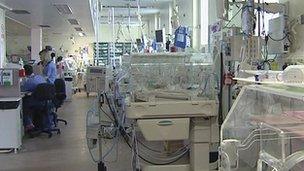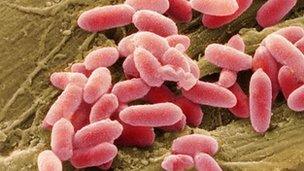Deep clean for Belfast hospital where three babies have died
- Published

The neo-natal unit at the Royal is undergoing a deep clean
The neo-natal ward at Belfast's Royal Jubilee Hospital is undergoing a deep clean this weekend, following the deaths of three babies from a bacterial infection.
The three infants died over a two-week period this month, having contracted the Pseudomonas infection.
A fourth baby is now being treated and all others in the unit are being tested to see if they have the infection.
The infection can live on surfaces for several days, one expert told the BBC.
Infection risk
Pseudomonas can cause breathing difficulties and tissue damage.
Three other babies at the hospital were diagnosed with the infection. Two recovered, while the other died of an unrelated cause.
The neo-natal unit has the highest number of intensive care cots in Northern Ireland, but as a result of the infection, two mothers were sent to Dublin to deliver their premature babies.
Cathy Martin, who went into premature labour in the Royal, had to travel to Dublin.
She said it was a blessing in disguise.
"Having lost a baby myself at birth last year I really can empathise, to some degree, with the parents who are going through what must be tramatic grief and a horrible hole in their lives now," she said.
It has also emerged that in December at Altnagelvin Hospital in Londonderry, a baby died of a different strain of the bacterial infection.
GP Dr Sarah Jarvis told BBC News the infection was a risk to "the very, very young, the very, very old, burns victims or cancer victims".

Pseudomonas bacteria can cause infections in the chest, blood and urine
She said the infection can take hold in areas such as sinks and in water pipes with stagnant water. The bacteria can live for several days on surfaces but can be destroyed by vigorous hand-washing.
She urged all visitors to make use of hygiene facilities when they visited the wards, as many people unwittingly brought infections into them.
Professor Hugh Pennington, a bacteriologist from Aberdeen University, said identifying the source of the of the infection would not be easy.
"This is very, very difficult detective work basically because one has to look at all sorts of possibilities," he said.
"This is a bug which of course is very common in nature so just finding it doesn't necessarily mean that that's the cause of the problem, you know, that you've identified it."
The Department of Health in Northern Ireland said there was no evidence to link the current outbreak in the Royal Hospital to that of the incident at Altnagelvin in December.
It said all necessary control measures were put in place at the time and "the infection was eradicated".
The Belfast Health Trust said a full investigation was being carried out.
It also said the test results from babies who have been swabbed may not all be known until the beginning of next week.
A helpline has been set up for parents on 028 90 635 389.
- Published9 October 2012
- Published20 January 2012